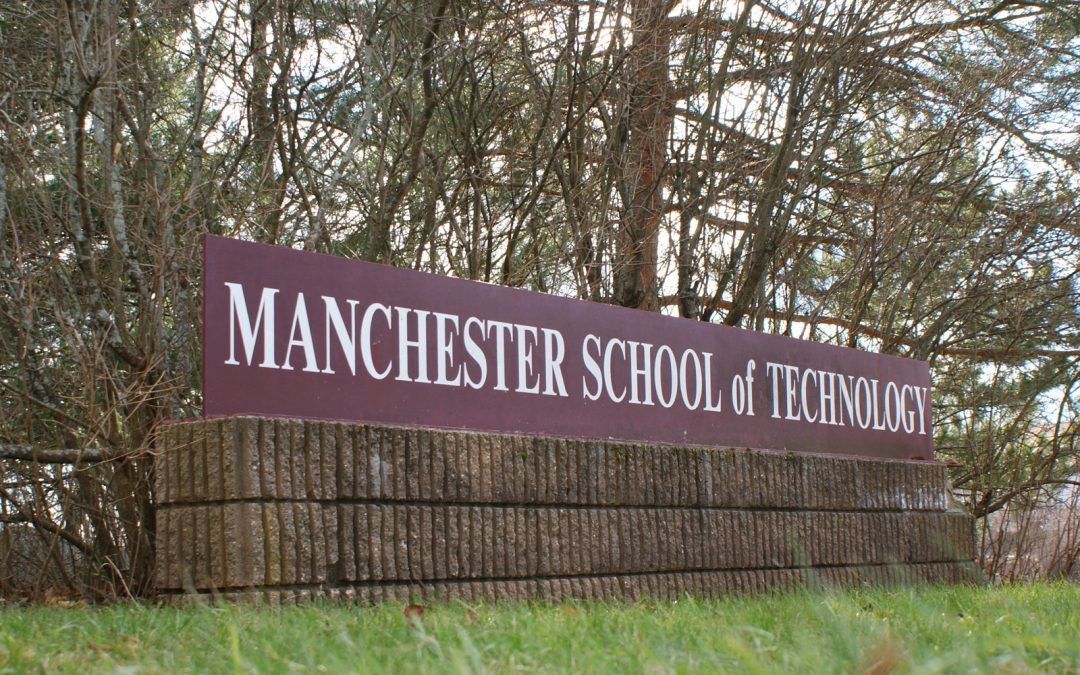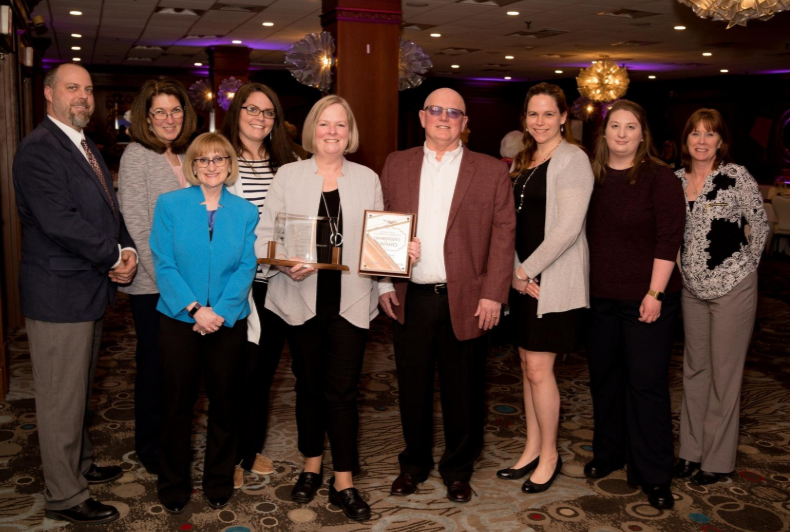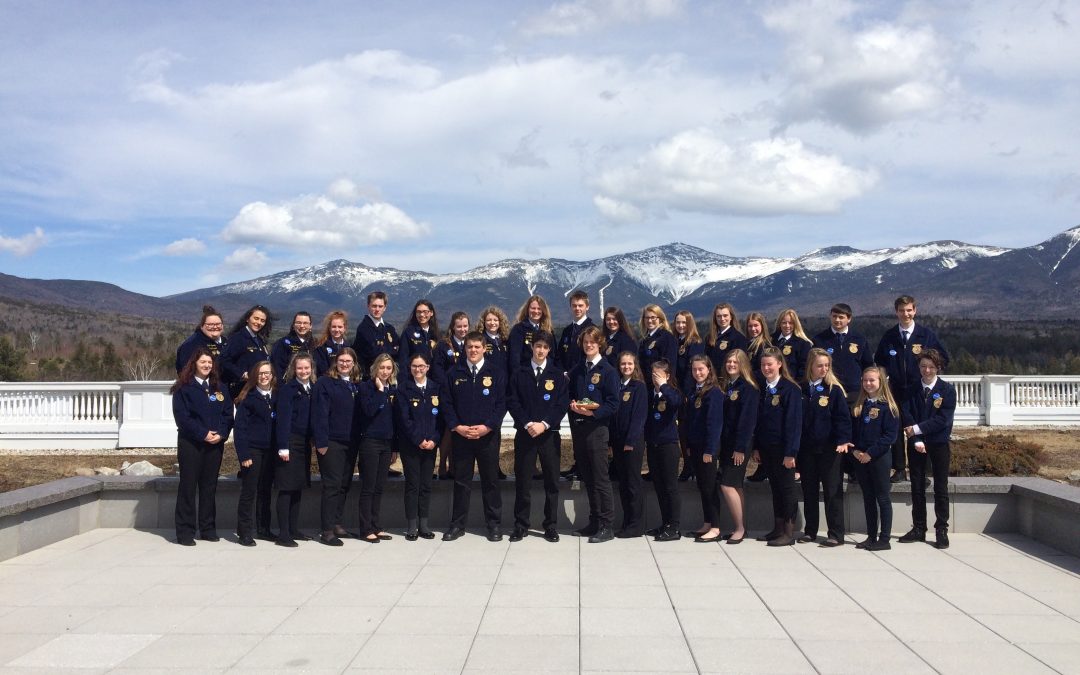
Jan 22, 2021 | Challenges and Opportunities, Impact, Leadership, Ticker
With programs ranging from culinary to marketing, biotechnology and more, Career and Technical Education (CTE) in New Hampshire provides high school students with opportunities to not only learn, but develop their knowledge in real-world settings.
“CTE is experiential career training,” explained Karen Hannigan Machado, principal of The Manchester School of Technology, one of more than two-dozen CTE centers across New Hampshire. “They train on the most up to date equipment and go out and learn in the field and job sites.”
This experiential aspect of CTE prepares high school students in measurable ways.
“They can go right into the job they prepared for in high school, or they will be further ahead in a certification or college program,” she added.
According to Jen Haskins, director of Career & Technical Education at Pinkerton Academy in Derry, CTE’s connection with — and alignment to — post-secondary education is often not understood by the general public.
“The biggest misconception people have is the level of rigor found in CTE classes statewide,” she said.
A majority of CTE classes also offer college credit and certifications in a variety of diverse industries.
“Many CTE students can graduate with six to 18 credits of college classes,” said Haskins, who also serves as president of the New Hampshire Career and Technical Administrators Association.
CTE programs are not, however, tied to specific jobs, but instead lead to “career pathways” that prepare students for a variety of different options.
“CTE puts students on trajectories that are far ahead of their peers in regards to hands-on skills and learning, all of which simulate an industry or career,” said Haskins. “CTE’s biggest value propositions include exploration, skill development, college credit and simulation-learning.”
In the Criminal Justice & Homeland Security program at Creteau Technology Center in Rochester, for example, these value propositions lead students through a deep exploration of the justice system in American society.
“They explore the question of crime causation from a number of theoretical perspectives and look at criminal law in the federal and state systems,” explained Michele Halligan-Foley, director of Career Technology Education.
In the program, students analyze essential elements of all major crimes, concepts of constitutional review and judicial scrutiny, and the principles that govern legal challenges to the constitutionality of laws.
“They also examine the causative factors in the development of youthful offenders and the development and philosophy behind treatment and rehabilitative practices,” she added.
The pandemic, however, threatens the viability of this and many CTE programs statewide, as directors navigate the logistical challenges related to providing “hands-on” learning in remote learning environments.
“It’s extremely challenging, especially for CTE students, who want the hands-on learning part,” said Vaso Partinoudi, director of Career and Technical Education, Applied Technology Center (ATC) at Milford High School.
Halligan-Foley agreed and said CTE centers statewide are losing students due to schedule changes brought about by the pandemic.
“It is going to take years to rebuild the numbers in CTE programs,” she said.
The potential impact goes well beyond education.
“The concern is how well-prepared our students will be when they try to get hired or go into training programs and college,” said Hannigan Machado. “It is very difficult to train people with only visuals.”
According to Haskins, CTE’s close connection(s) with industry partners may take on increased significance in the future.
“The relationships CTE programs have with industry is the backbone to students’ success,” she said. “These connections help guide us on curriculum development and real world applications, including opportunities like apprenticeships and internships. We will need to strengthen these relationships.”
Hannigan Machado added, “If we don’t, businesses will need to add more training on their side and won’t have career ready employees…If CTE struggles, the state’s economy struggles, too.”

Jan 17, 2020 | Impact, Leadership
In June, Region 14 Applied Technology Center (ATC) and Conval High School in Peterborough will host AMPED on Algebra, a workshop for teachers that underscores an important concept behind Career and Technical Education (CTE) itself.
“It is important that CTE instructors demonstrate to students that the competencies we are teaching represent the knowledge and skills they will need to be successful in their careers and college,” said Region 14 ATC Director Jen Kiley.
In speaking about the upcoming AMPED on Algebra workshop, Kiley said it is important that CTE programs formally include core academics.
“We help make clear to students that they will need those math and ELA skills to be successful as well,” she added.
For Kiley, her interest in AMPED on Algebra is matched by another program, Geometry in Construction, both of which are designed by Contextual Learning.
“Both programs present mathematical concepts in a hands-on way that is connected to high interest career paths for students,” she explained. “They recognize the fact that students learn math and English skills as part of many career and technical education programs.”
She said the curriculum in both programs make it clear that CTE and academic competencies are addressed at the same time.
“I personally attended the June 2019 Geometry in Construction workshop in St. Albans, VT last year and was blown away by how much I learned as an adult,” she said . “It was especially interesting, because I identify as someone who is not great at math or building.”
Kiley said she has no doubt that students will find the same success as she did.
“Many high schools are dealing with issues regarding pass/fail rates in traditional academics, and this could be a way to help address those concerns,” she added.
In looking across Region 14 ATC as a whole, Kiley said different CTE instructors already include cross-curricular lessons and units in their programs. June’s workshop, she explained, would extend what their teachers are already doing.
“By allowing students to access disciplines they may find challenging through the CTE programs where they’ve already found success or feel comfortable, we are providing more opportunities for positive student outcomes,” she said.
As far as Kiley is concerned, the importance of AMPED on Algebra and similarly designed educational programs cannot be overemphasized.
“Very few people have careers solely in math or English, but all careers include elements from these two disciplines,” she said. “By ‘crosswalking’ academics with CTE, we are answering the ever-present student questions of ‘Why do I need to know this? and ‘When will I need this in my life?’”
The “beauty of CTE,” she went on to add, is students are not left asking these questions because “it’s completely transparent what they are learning and why.”
“Students need math and ELA skills to be career ready too, and this AMPED on Algebra is one tangible opportunity to show them why,”
To learn more about AMPED on Alegbra,or sign up for the workshop, which takes place June 22 to June 25 at Conval High School, click https://contextuallc.com/amped/new-hampshire.

Sep 17, 2019 | Impact, Leadership
Recently, David Ryan, Superintendent of School at SAU 16, spoke about the importance of helping build pathways to careers for students at Seacoast School of Technology, a topic he feels should receive more attention.
“The current state of education includes multiple pathways for students that don’t resemble traditional schooling of years’ past,” he said. “We have more K-12 students learning in community settings, colleges and universities, internships, independent studies, and extended learning opportunities.”
These opportunities, he said, stand in stark contrast to prior educational models in which students “were required to sit for a definitive number of hours in a classroom chair and learn only in the schoolhouse.”
“The roll-out of competency-based education as a regulatory requirement in 2005 was groundbreaking in terms of requiring it in all schools,” he said.
Ryan said the concepts behind competency-based education have been alive and well for years in career preparation models, such as CTE and corporate-sponsored training programs. These models, he noted, underscore a very important shift that has begun and will continue to take place in education.
“We have begun to talk seriously about training students to be thinkers and leaders as opposed to rote memorization of facts and redundancy of skills,” he said. “Students need to be able to assimilate and adapt to the changing labor market.”
The concept of “career pathways” is not mere ,either.
“Science and technology move too rapidly to single out one specific career path,” he said. “Building a fundamental skillset on the basics of science and technology and then applying those basics to increasingly complex experiences that promote inquiry, prototyping, and discovery will be the new way to learn.”
He said this new way to learn rests on partnerships between schools and industry.
“We need our community partners and business leaders to begin providing those experiences and guidance now,” said Ryan, who said the economic lever of every community is its school system.
“In New Hampshire, real estate values rise and fall depending upon the quality of the education people believe their children receive,” he said. “The quality of the education can depend quite heavily on the financial support it receives from the town.”
He said that employers seeking quality job candidates, particularly those with young families, find it much easier “to recruit and hire the very best” when they are able to demonstrate the strength of the schools.
“A high quality school traditionally attracts families who value education, making it easier for businesses to not only stock their rosters but thrive in retail settings,” he added.
Noting schools are “preparing the employees of tomorrow,” Ryan said it is critical businesses and schools work together to complement an educational program that includes adaptability to changing markets and accessibility to good paying jobs.
“This is essential if communities are going to sustain their quality and growth by keeping our graduates here,” he said.
Presently, Ryan said this is an issue that is not receiving the proper attention it deserves.
“Thankfully organizations like NH Coalition of Business and Education, Stay Work Play NH, and the Governor’s Task Force for the Recruitment and Retention of a Young Work Force for NH are addressing it with gusto,” he said.
As for steps he is taking in his own district, Ryan said they are expanding their Extended Learning Opportunity (ELO) program to include a full time coordinator.
“We want to better serve the individual needs of students who are seeking such opportunities as well as expand and introduce them to the meaningful and rich experiences from among a more broad array of organizations,” he said.
He said that part of this process will include guiding students through some form of personal reflection to help them understand self-knowledge and the impact that has on their outlook to the future.
“ELOs can do this, but we also want to enhance our internships that currently exist with our current business partners by introducing cooperative education experiences that involve full-time employment that carries academic credit,” said Ryan.
He said their goal in SAU 16 is to create more opportunities for students to discover their passion and then create a supported path of exploration.
“We believe this will allow our students to really focus more on what they want to do after graduating from high school and be better prepared to do it successfully,” he said.
To learn more about SAU 16, visit sau16.org.

Jul 4, 2019 | Industry, Leadership, Programs
There are many pathways into a career, which underscores New Hampshire Lodging and Restaurant Association’s role in Carroll Academy, an adult high school program in Tamworth, NH.
“In this current workforce climate, you need to look into every possible resource and partnership,” said Amie Pariseau of New Hampshire Lodging and Restaurant Association (NHLRA).
Whereas much of her work consists in partnering with New Hampshire Career and Technical Education Centers, Pariseau said she saw an opportunity with Carroll Academy, which has resulted in Introduction to Hospitality.
Aimed at adults who do not have their diploma or HiSET (high school equivalency like the GED), the program is collaborative in nature, according to Crystal Sawyer, director of Carroll Academy/Carroll County Adult Education.
“I was approached in May of 2018 by Amie and Christina Baker from the Mount Washington Omni Hotel, to see if I would be interested in teaching a certified Hospitality course,” she explained.
In September of 2018, Sawyer said Michelle Hart from NHWorks indicated they could partner with the group and could pay for the class for any student eligible for a Basic Skills grant.
“If the student was making under $15 and was looking for a job in hospitality, they could take this beginner’s Hospitality class,” said Sawyer. “NHWorks would also help them find a job after the class in the field.”
In designing the certified class, Sawyer chose the AHLEI START (Skills, Tasks, And, Results, Training) 180-hour Curriculum Program. The START Program, she explained, is basically an introduction to every position in the hospitality sector — Front Desk Representative, Security, PBX Operator, Bell Attendant, Maintenance, Laundry, House Keeping, Food and Beverage, etc.
“At the end of the course, the student takes a final,” he said. “If they pass that, they get a START Certificate that they can show an employer.”
Noting the first class ran once each week with three recent graduates, Sawyer said Carroll County Adult Education is the first Adult Education center in the state to teach this certified AHLEI START course.
“We also have an Articulation Agreement with White Mountains Community College stating that our Hospitality course is considered a 3 credit course for their Introduction to Hospitality program,” she said.
Students in the class are diverse.
“I have an ESL student that has been with us for years and would like to switch career paths,” said Sawyer. “Another student is a former HiSET graduate who works in hospitality and would like to move up the ladder with her certificate.”
According to Pariseau, NHLRA could not be more excited about the possibilities for the program.
“We hope to see it grow and taught at other centers,” she said.
Currently, Pariseau said there are in fact plans for Manchester Adult Education to role out a similar program this fall.
Regarding the program at Carroll Academy/Carroll County Adult Education, which may soon include an apprenticeship track, she said students receive much more than an introduction to the hospitality industry.”
“They are receiving a nationally recognized certificate and a pathway to continue their education if they choose to do so,” she said.
In looking ahead at NHLRA’s role in general, Pariseau stated, “We will continue to support the efforts of all of our education partners as we look to continue to build a workforce pipeline and support current workforce needs of the industry.”
To learn more about NHLRA, visit https://www.nhlra.com. To learn more about Carroll Academy, visit https://www.carrollacademy.net.
.

May 4, 2019 | Achievements, Article, Leadership
Longtime St. Vincent de Paul board member and Exeter Rotarian Rachael Ela was named Citizen of the Year at the Exeter Area Chamber of Commerce’s Business of the Year awards.
The annual ceremony, which honors businesses and community leaders, took place March 28 at the Ashworth by the Sea in Hampton.
Ela was named Citizen of Year for her numerous contributions over the years to the Exeter community, including her work organizing the annual Rotary Club’s “Stuff a Bus” food drive to benefit the Society of St. Vincent de Paul Exeter and for running the club’s annual charity auction. As a past president of the Exeter Area Rotary Club, the group awarded a grant in partnership with Christ Church to provide water filtration systems to Cuba, she said.
Ela said she looked up to the former director of the Society of St. Vincent de Paul Exeter, Cleo Castonguay, for his generosity and kindness he showed towards those in need during his 30-plus years at the organization before his death last spring at the age of 71. She said one of the first events she ever attended in Exeter after moving to town seven years ago was the Chamber’s Business of the Year Awards when Castonguay received the inaugural Citizen of the Year Award in 2012 and he was the primary reason why she decided to volunteer at the organization.
“Cleo was such an important part of my life and I strive to emulate him as best I can in everything I do, so to be recognized in the same way he was, it’s really beyond comprehension,” Ela said. “This is an incredible honor. Service is a reward in itself; you get so much more than you give. I hope people see the opportunities there are to give back and they ask more questions about how they can get involved serving the community.”
Also recognized was retiring Seacoast School of Technology Principal Margaret Callahan.
Callahan has worked as SST principal for the past 14 years and was honored with the Chairperson’s Award for her years of service at the technical center, which serves five Seacoast school districts beyond SAU 16. She said the enrollment at the school has increased “dramatically” since beginning her tenure and the school now offers 33 dual-enrollment programs, which allow students to earn college credits while taking SST classes.
SST was also recognized as a Business of the Year in the education category by the chamber.
“This was an incredible honor when I looked around the room; it was just so inspiring to be in the same company as everyone there who serve the community so well. A lot of them have been great supporters of SST through the years,” Callahan said. “Our certifications are just as valuable as a degree depending on the industry. Students and families see the value in tech education and if it’s something they think they want to pursue professionally; our programs are designed to prepare them as much as possible.”
The other individual award winners included Cooperative Middle School English teacher Melissa Tobey as Educator of the Year; Derek Foley of Liberty Mutual as Ambassador of the Year, and Chamber Director of Member Partnerships Bobbi Vandenbulcke received the President’s Award.
The other Business of the Year winners were Clean by Sea, for business services; ReVision Energy, for manufacturing, construction or real estate; Staples, as a large retail or wholesale business; Wireless Zone, as a small retail or wholesale business; Sea Dog Brewing Company, for large tourism and hospitality; Laney & Lu, for small tourism and hospitality; St. Vincent de Paul, as a non-profit; Elliot Evans, of Edward Jones, for independent financial services; and Kennebunk Savings Bank, for commercial financial services.
Jennifer Wheeler, president of the chamber, said each of the award winners made significant contributions to making the Exeter area a thriving community.
“We are so proud of this year’s award winners,” Wheeler said. “There is so much to celebrate in our communities and it is important that we take time to recognize these outstanding businesses and individuals who continue to make this region a vibrant community to live, work and play.”
Exeter Hospital was the Business of the Year Awards’ diamond sponsor and Mark Whitney, vice president of strategic planning at Exeter Health Resources, said though the hospital is a major economic driver in the region, maintaining a healthy community takes the entire business community pulling together in the same direction.
“We see both Exeter Health Resources and the Exeter Area Chamber of Commerce as community leaders and catalysts and that is why we value our partnership so deeply,” Whitney said. “Improving the health of the community is a team sport and we like being part of this team.”
LaCasse, Alex, and Alex LaCasse. “Exeter Chamber Honors Community Leaders, Businesses.” Seacoastonline.com, Seacoastonline.com, 4 Apr. 2019, www.seacoastonline.com/news/20190404/exeter-chamber-honors-community-leaders-businesses.

May 1, 2019 | Leadership, Programs
Recently, Margaret Callahan, principal at Seacoast School of Technology (SST), was awarded the Honorary State Future Farmers of America (FFA) degree in recognition of her support and dedication to agricultural education students in New Hampshire.
Acknowledging she was “overwhelmed” and “stunned” by the accolade, Callahan said the real story is the strength of the Animal & Plant Science program at SST.
“It consistently has one of the highest enrollments of any program in the school and the longest waiting list,” she said. “It is extremely popular and we have an incredible teacher in Anne DeMarco.”
It is a program, said Callahan, she has long supported.
“They work hard and they believe in what they are doing and they have a great teacher, so it just makes sense to support it,” she said.
In speaking about the program, she noted one of its most important aspects is student involvement in various fairs and competitions that test their respective skills and knowledge.
“We typically bring 70 kids to the Deerfield Fair, and every one of those students is going to compete in something, so it is very much a business trip for them – it is serious stuff,” she said.
She said students in Animal & Plant Science also typically earn spots at the Eastern State Exposition in the fall in Springfield, Massachusetts. She described it as “a huge agricultural event.”
“ I have even been to the national competition with them and I typically go to the Granite State FFA Convention every year,” she said.
This year, SST FFA Members of the program won 15 state titles at the 89th Granite State FFA Convention. In addition to the 15 state titles, other highlights included 39 students participating in the event. Jenna Marston, president of the SST FFA, won the Outstanding Chapter Officer Award, while Stephanie Gablosky won the Wilbur H. Palmer True Grit Award.
“It is a great program and the kids are amazing,” she said.
According to Callahan, another key aspect of the program is the FFA itself.
“Through FFA events, students are learning not only how to compete, but leadership, which is related to all of those skills learned in competition,” she added.
Callahan said she hopes the takeaway by the general public regarding her award is that agricultural education is alive and well in the state of NH. She said she also wants the general public to understand the value it provides the local economy.
“Not enough people know about FFA or agricultural education in the state,” she said. “I want people to know FFA and agricultural is not something from the past. It is about our future. These students are all learning about the future of agriculture and the scientific side of everything.”
She cited examples of current work by students as consisting of artificial insemination on cows, aquaculture, aquaponics and hydroponics.
“It is very scientific and important stuff,” said Callahan, who credited DeMarco for her efforts.
“We are really fortunate that we have the teacher we have and that the students are pursuing this education,” she said.
To learn more about Animal & Plant Science at SST, visit https://www.seacoasttech.com/animal-plant-science.






